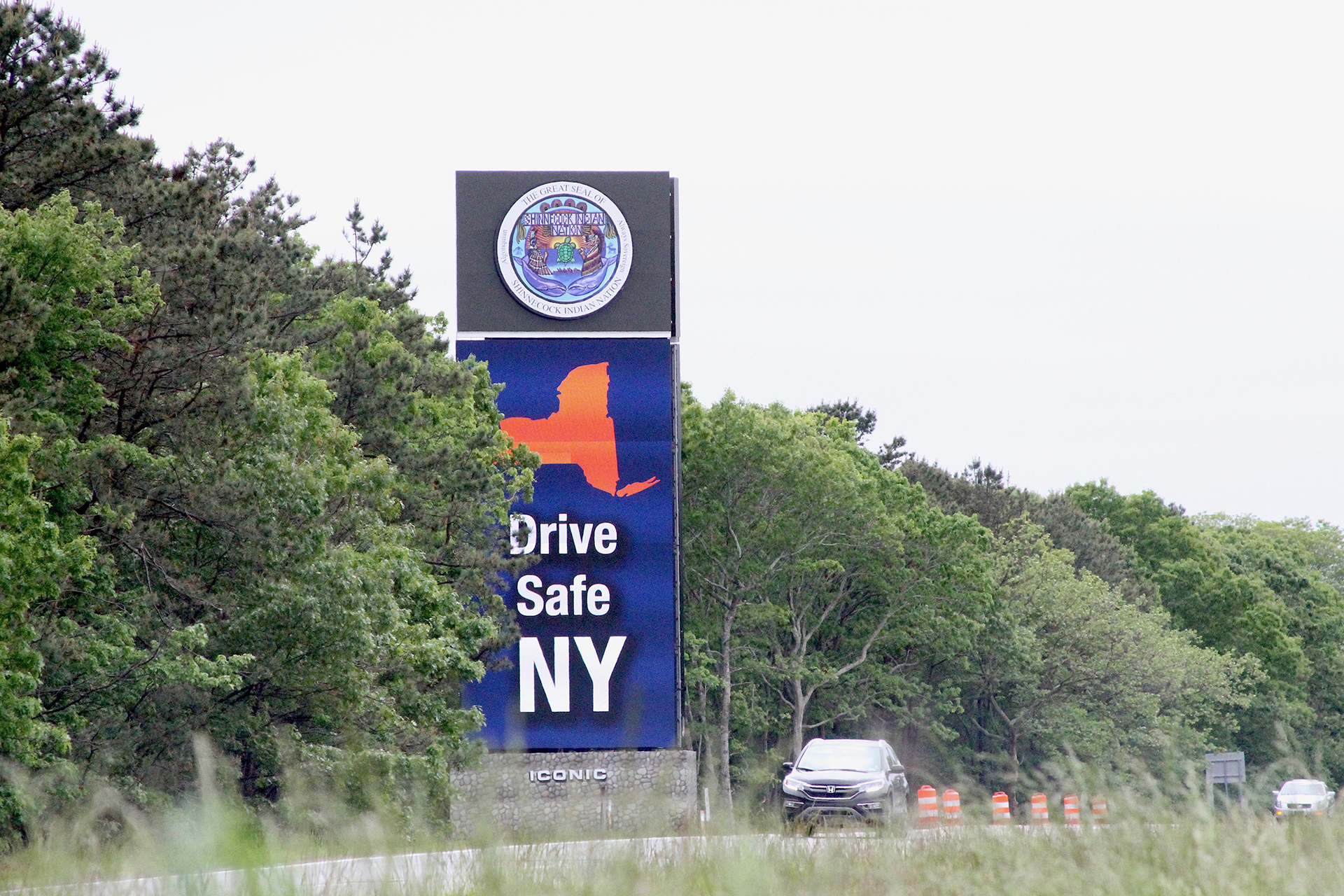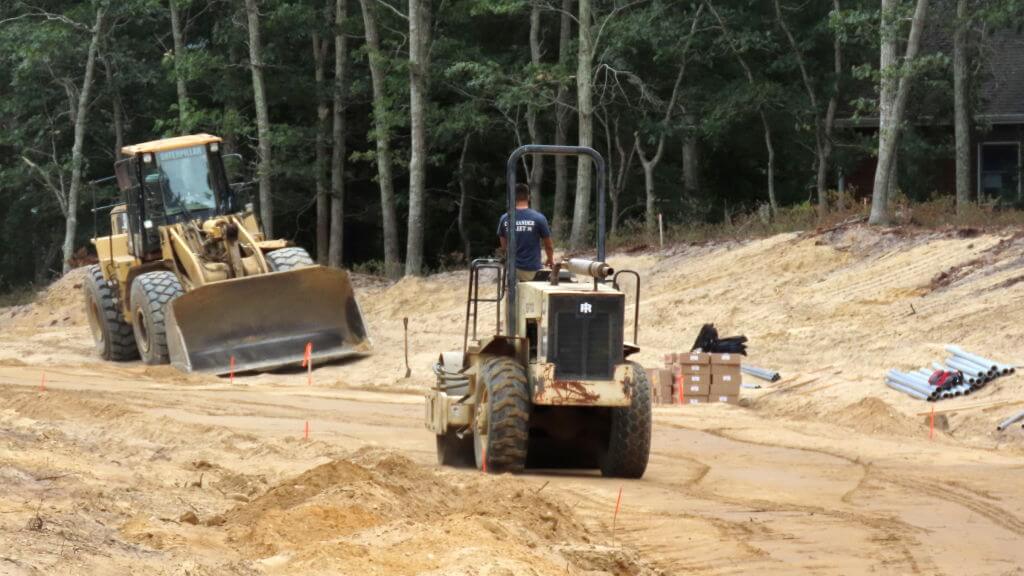Shinnecock Suits: Fed's Letter Adds Twist to Westwood Litigation

The federal agency that oversees Native American tribes has suggested that the Shinnecock Nation’s ownership of land known as Westwoods may not be subject to local zoning restrictions, intensifying a jurisdictional debate.
The determination by the U.S. Department of Interior — the parent agency of the Bureau of Indian Affairs — came as the debate boiled over regarding the 79-acre plot of tribe-owned land in Hampton Bays that is separate from its territory in Southampton. The Shinnecock are reportedly using the letter to appeal a recent appeals court ruling that suggested that a pair of electronic billboard monuments on the side of Route 27 at Westwoods could be shut down. But despite the federal opinion, the Town of Southampton is moving forward with a lawsuit against the Shinnecock seeking to block the tribe’s ongoing construction of a gas station and travel plaza at Westwoods.
“The department examined the land title status of the Westwoods parcel and determined that it is within the Nation’s aboriginal territory, that the Nation has resided within its aboriginal territory since time immemorial and has never removed therefrom, and that Westwoods is within the purview of the Nonintercourse Act and is therefore restricted against alienation absent consent of the United States,” Bryan Newland, the Assistant Secretary of the Department of the Interior, wrote in a letter to the Shinnecock Nation Council of Trustees. “This land is and has always been restricted fee land held by the Nation and is now recorded to reflect such status.”
The clash also comes as the tribe, which won long-sought federal recognition in 2010 — joining nearly 600 tribes nationwide — is simultaneously working to build a casino on its territory in Southampton, as well as a hotel at Westwoods, chafing neighbors in traffic-choked surrounding communities that boast some of the priciest real estate in the country. But because the tribe is a sovereign nation, local municipalities have little power over construction on its territory.
The Shinncock were bolstered by Newland’s letter on the tribe’s Westwoods property.

“This confirms the position of the restricted fee land status the Nation has always acknowledged and publicly stated,” the Shinnecock Nation Council of Trustees stated. “Moving forward, the Shinnecock Nation welcomes the opportunity to work with New York State and Southampton Town on a government-to-government relationship and that this determination dispels any misconceptions. The Nation will consider any concerns that have been raised regarding the jurisdiction over our Westwoods aboriginal territory and other ancestral tribal lands.”
The Southampton Town Board, which voted 3-2 on Dec. 19 to hire the Philadelphia-based law firm of Morgan, Lewis & Bockius LLP to commence legal action against the Shinnecock to stop the gas station, was not dissuaded.
“My office has been reviewing the correspondence from the Department of Interior concerning the Westwoods property,” Southampton Town Attorney James Burke told Dan’s Papers. “This office is hoping to be in contact with the Department of Interior to obtain further information regarding this communication and how this determination may impact the jurisdictional issues regarding this property at the federal, state, county and town level. This office is encouraged that the Nation would like to continue to move ahead in a government-to-government relationship and have expressed a desire to be open to address concerns raised by the surrounding community and are looking forward to further discussions with the Department of Interior Bureau of Indian Affairs on this latest determination and the town’s responsibilities as the municipality with land use control pursuant to state and federal law.”
Southampton Town Councilmember Michael Iasilli, one of two board members who voted against suing the tribe, argued that the town board should reconsider its litigation.
“In light of this important update, the town should reassess its approach that brought legal action against the Shinnecock Nation and establish a true government-to-government partnership once and for all through an official Inter-municipal Agreement (either with the Tribe or Federal Government) to guarantee cooperation and collaboration,” Iasilli stated. “There are still questions that require the town’s input such as the Nation’s access to local utilities and emergency response services. Therefore, it is critical that the federal government play a more active role at this juncture, providing recommendations and mediation on how we proceed as a municipality with the Nation on these matters.”
“At a time when we should be finding ways to work together on all levels of government, I believe the appropriate action now is to work together,” Iasilli added. “Continuance of the town’s legal action against the Nation in light of this clarification from BIA will only harm Shinnecock-Southampton relations, rehash the traumatic history of displacement of Native Americans, and prove wasteful to hardworking taxpayers. As the new year begins, my hope is we can all work collaboratively to reset and restart in a positive and productive direction”
While the town does not appear to be backing down in light of the letter, the Shinnecock are using the correspondence to appeal a recent ruling in another Westwoods-related lawsuit.
Attorneys for the Shinnecock filed court papers on Jan. 3 asking New York State Appellate Division Second Department judges to suspend and reconsider their ruling last month that a lower court should have approved the state Department of Transportation’s request for an injunction blocking the construction of two 61-foot electronic billboards on the side of Route 27 in 2019, Newsday reported. The billboards have remained active since that ruling was issued on Dec. 4.
The Shinnecock have called the billboards monuments and used the advertising revenue to fund programs to help tribal members. The DOT argued that the Shinnecock did not have the necessary approvals legally required to build the billboards on the land because it was on a state-owned right-of-way running along Route 27. The state DOT declined to comment on the motion, citing pending litigation.
Don’t expect the tensions to ease anytime soon.
“You wanna come against us and attack us with litigation? We’re not gonna back down,” Lisa Goree, who chairs the Shinnecock Nation’s council of trustees, told the board last month. “We’ve been here for over 10,000 years. We’re gonna be here for thousands more … This is just another battle that we’re ready to fight.”



